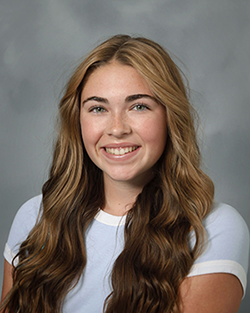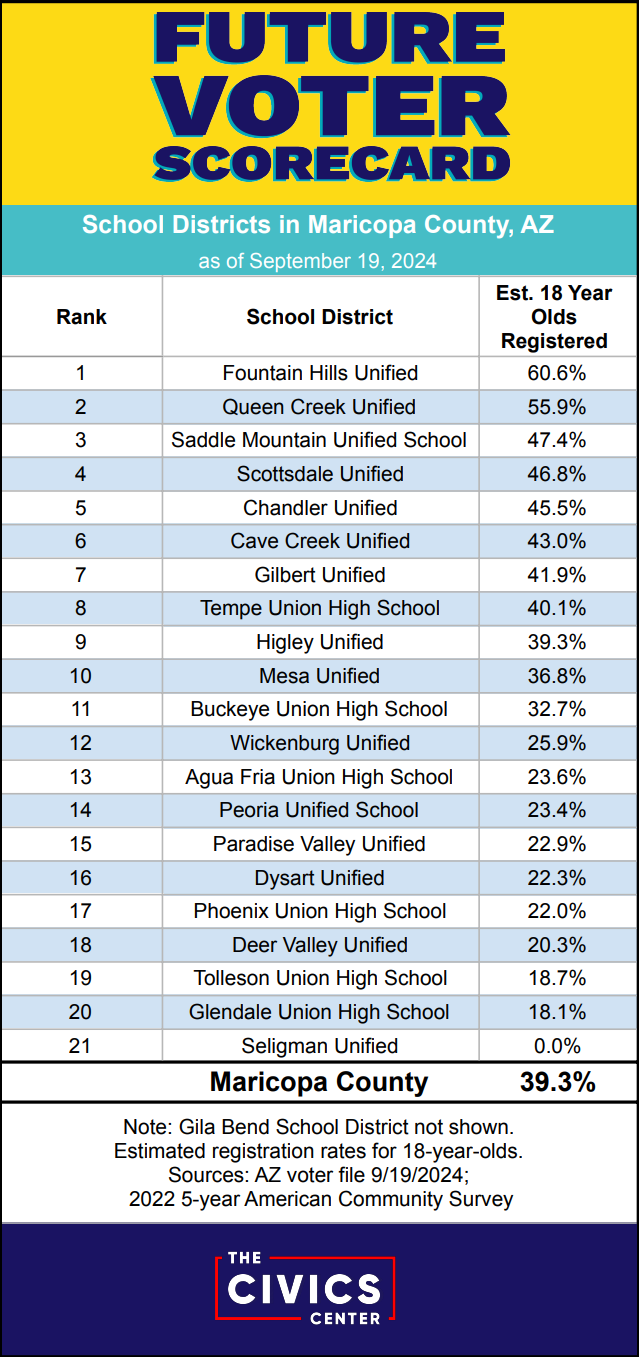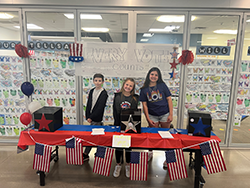Queen Creek Students Lead Real Change at Their Schools, Spark a Lifetime of Civic Engagement
Sophomore Rylan Christian beams with pride talking about her school, Eastmark High School, in Mesa, Ariz. She’s channeled that overflow of school spirit into real action through School Participatory Budgeting (SPB) implemented by Eastmark’s Lead Out Loud (LOL) Club, a district-wide initiative in the Queen Creek Unified School District (QCUSD).
|
|
|
|
||
|
|
||||
|
|
 |
|
||
| Rylan Christian has been a member of LOL since eighth grade. When the Eastmark LOL Club met with the other clubs across QCUSD, Christian said she was surprised and amazed that other schools across the district had similar challenges and ideas. | ||||
|
|
||||
|
|
||||
“It’s really cool that being a part of LOL I get to help with my school,” Christian says. “It’s getting bigger, and there’s a lot of things to be done. The fact that I can have a little part of that is very cool to me. It’s also made me realize that by being involved, I can help make things happen in my community.”
SPB is a year-long democratic process in which a student-led steering committee, including students like Christian, brainstorms and gathers ideas, organizes schoolwide campaigning, and leads the voting for a district-funded school improvement project. During the 2023-2024 school year, 305 QCUSD students in grades 4-12 served on these steering committees, guiding their entire school communities through each stage of the process and encouraging participation from all students.
This year, Eastmark students, who range from 7th to 12th grade, will vote whether to implement new permanent trash cans, wheels for classroom chairs, or a bike rack extension. Previous projects include more outdoor lunch seating and a new outfit for the school mascot. Beyond following each step of the process, Christian has witnessed the excitement as projects are completed and students recognize that their vote made this possible.
She’s also connected with fellow students across grade levels in new ways, gaining insight into their perspectives. The LOL Club intentionally invites students who may not already have leadership roles at school to serve on the SPB steering committees. This allows students from a broad range of backgrounds, abilities, and circumstances to have a substantial voice in affecting their school experience.
Christian has broadened her understanding of community, team building, and leadership. She says the SPB process has made her consider and listen to other people’s experiences in decision making, realizing that while we each have our own preferences, we are connected through the spaces, schools, and communities that we share.
“When you vote, you have to think of everyone as a whole and how the whole community will be impacted after the voting,” says Christian. “I have a better idea of what bigger things will impact our community.”
Center for the Future of Arizona (CFA) and the Arizona State University (ASU) Participatory Governance Initiative (PGI) first partnered with QCUSD to bring SPB to five schools in 2019. Now, all 14 QCUSD schools participate – the first district in Arizona to embrace the process at all schools and grade levels.
Robin Bayles, Director of Educational Technology and Virtual Learning, oversees SPB for QCUSD. She says she’s seen a positive culture shift because of the initiative.
“SPB is a great opportunity to give our students a voice in their school, but broader than that, it helps them understand how democratic processes work and why that understanding matters,” says Bayles. “Knowing how decisions are made and how to engage gives them the tools to impact their community but also their own lives, now and in the future.”
Initiatives like SPB are making a real difference in fostering local civic participation. Research from Tufts Circle, a non-partisan organization focused on youth civic engagement, shows that when students actively learn about civics in school, they’re more likely to become voters as adults.
The district's commitment to SPB reflects an overall commitment to strong civic engagement. In fact, as of May 2024, 56% of QCUSD's 18-year-olds were registered to vote compared with only 25% of all Arizona 18-year-olds according to data from The Civics Center.
Over 100 high school students in Queen Creek registered to vote through the Maricopa County Recorder’s Office for future elections during the district’s SPB Vote Days in the 2023-2024 academic year.
|
|
||
 |
|
|
| The Civics Center tracks 18-year-old registration and turnout for 17 states, including Arizona. | ||
|
|
||
Additionally, research evaluations of SPB led by ASU PGI have shown an increase in students’ communication, teamwork, empathy, responsibility, and problem-solving skills.
SPB moves students beyond simply memorizing how government works–they actively participate in each step of a democratic process, from learning about their school and district landscape to idea generation, campaigning deliberating, and voting. This hands-on, immersive approach gives them a tangible result in the form of a winning project, clear evidence that their voices make a difference. SPB not only deepens students’ understanding of American history and government but also builds their confidence in their own civic strength and ability to shape their communities.
These outcomes align closely with what Arizonans see as vital for our state’s future. Nearly twenty years of CFA’s public opinion research show that Arizonans value civic engagement that solves problems and a democracy that works for all. There is strong support for leaders who foster understanding across differences, create a transparent, data-driven culture in government, and build a pipeline of civic-minded leaders focused on the long term.
SPB is one of CFA’s Civic Health Impact Initiatives designed to advance these priorities for civic engagement and leadership in Arizona. CFA also tracks progress through the Arizona Progress Meters, which measure Civic Participation and Connected Community trends statewide.
The above statistics are a snapshot from CFA’s Arizona Progress Meters, which measure indicators of civic health to help communities and leaders understand where Arizona stands today.
School Participatory Budgeting contributes to building The Arizona We Want by empowering the next generation to understand the potential and opportunity in their individual voices and the importance of listening to community feedback.
|
|
|
|
||
|
|
||||
|
|
 |
|
||
| Elementary students at Gateway Polytechnic Academy prepare for a Vote Day, when students decide which school improvement project they will invest in. | ||||
|
|
||||
|
|
||||
Fernando Otero, the Dean of Students at Eastmark High School in QCUSD, has seen firsthand the ripple effects SPB creates when students “learn democracy by doing.”
"The will of students through voting illuminates how an idea that may only impact a small group of students can positively impact the entire campus,” says Otero. He adds, “It may not go the way that you personally want it to, but that doesn’t mean it's not going a way that still benefits everyone on campus.”
While voting in a local, state, or federal election is still a few years away for many QCUSD students, Christian can’t wait to participate in the “real world.” Through SPB and her involvement with the LOL Club, she feels more prepared. “It’s still daunting but with what I have learned, voting will be easier.” And her passion for making a difference doesn’t stop at the ballot box. “I definitely want to be involved in my community.”
If you are interested in bringing School Participatory Budgeting to your school or community, please email us or fill out an interest form.


